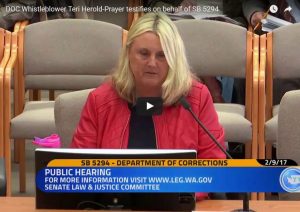
Click here to see Teri Herold-Prayer’s testimony: “Either keep your mouth shut or risk your career for telling the truth.”
OLYMPIA – A bill prompted by deadly prisoner releases by the state Department of Corrections is set for a vote Thursday in the Senate Law and Justice Committee, a year after the agency revealed it had turned loose some 3,000 violent and dangerous prisoners ahead of schedule.
Senate Bill 5294, sponsored by committee chair Mike Padden, R-Spokane Valley and vice chair Steve O’Ban, R-University Place, would enact sweeping recommendations for reform made by the committee, following one of the most extensive investigations in the history of the Washington State Legislature. The bill would:
- Establish that DOC’s primary duty is to protect public safety.
- Create an independent “ombuds” office to investigate complaints, monitor the agency’s performance, and advocate reforms. The new office would deal with concerns raised by employees, inmates and their families.
- Require the Department of Corrections to hand-calculate release dates if it has any reason to believe a sentencing calculation error has been made.
- Require DOC to inform the governor and the Legislature about any backlog in requests for information-technology fixes.
- Require the Joint Legislative Audit and Review Committee to conduct a performance audit of the agency’s information technology and records departments, and make recommendations about proposed fixes.
- Reinforce state law assigning the governor ultimate responsibility for the conduct of all offices under his control, and require the governor to ensure they perform their duties as prescribed by law and ensure personal and professional and personal conflicts of interest are avoided
- Create a legislative task force to simplify criminal sentencing – without reducing sentences.
- Enact reforms to the State Employee Whistleblower Program overseen by the state Auditor’s office.
“This tragic case continues to haunt us today,” Padden said. “Two people might still be alive were it not for the bureaucratic indifference of the Department of Corrections. The worst part is that this isn’t the only example of a systemic management failure at DOC – it’s just the one we have heard the most about.”
O’Ban, who helped lead last year’s inquiry, said, “Our independent Senate investigation of the DOC made one thing abundantly clear. The DOC needs reform and greater transparency. We are hopeful the DOC will embrace the reforms of this bill to help restore the public’s confidence in this vital public safety agency.”
Two deaths and numerous crimes have been linked to the agency’s early releases of prisoners, which occurred over a 13-year period starting in 2002. The releases, disclosed to the public in December 2015, involved inmates convicted of armed crimes and sexual violence. The early releases averaged 59 days but ranged up to nearly two years. The initial mistake was caused by an error in computer programming, but it was compounded a decade later when Corrections employees learned of the problem. Their request for a software fix was delayed three more years and the releases continued.
A full accounting of the impact of the early releases has never been completed, though an incomplete analysis released by DOC last year indicated that at least 29 offenders committed new crimes when they should have been in prison.
Last year, a report commissioned by Gov. Jay Inslee pinned the blame on mid-level employees, largely exonerated upper managers, and was silent about the responsibility of the governor’s office to supervise the agency. A broader-ranging independent investigation by the Senate Law and Justice Committee established that top DOC executives had sufficient knowledge to take action, yet failed to do so – and they displayed a remarkable lack of curiosity when middle managers flagged the matter to their attention. Instead, they continued to divert agency time and resources to an ambitious and still-unfinished computer project.
The Senate investigation, utilizing sworn testimony and subpoena power, also established that the governor’s office had sufficient knowledge of the early-release issue to make inquiries, and that it ignored other red flags of management problems, including heavy turnover in the agency’s IT department and reorganizations that made no sense. The investigation also found that a personal relationship between former Corrections Secretary Bernie Warner and a senior member of the governor’s staff may have discouraged inquiries because the conflict of interest was not addressed appropriately.
The committee offered its recommendations last May after issuing a report of approximately 1,000 pages.
“It is hard to imagine a more egregious failure of management oversight,” Padden said. “And now that we have had a year to consider reforms, it is time for us to take action to prevent such a tragedy from recurring.”
As part of its investigation last year, the Senate committee sought comments from the more-than-10,000 employees of the Department of Corrections. Many said agency managers targeted front-line employees who dared to criticize management practices. The point was underscored at a Feb. 9 Law and Justice hearing on Padden’s reform measure. Teri Herold Prayer, a former DOC researcher, said she was demoted and faced other retaliation after she made a whistleblower complaint regarding fraudulent data used in submitting a research grant application. Ultimately she settled a lawsuit against the state, but said the settlement barred her from future state employment.
“The cost for telling the truth is too great,” she said. “I am now having to look for work in other states. I will have to leave my family and friends. At my age, finding employment is going to be difficult at best. The message my settlement sent to the DOC staff and all state employees is either keep your mouth shut or risk your career for telling the truth.”






